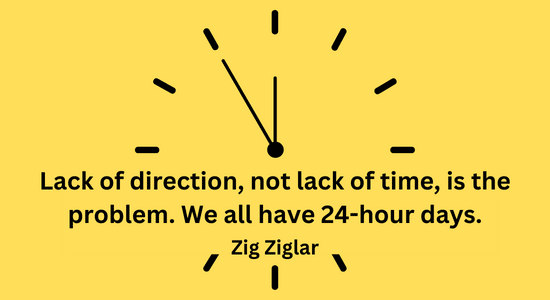When we think about the habits of wealthy people, we often focus on their financial strategies. But many of their non-finance-related daily practices could also be adopted by anyone. How do wealthy people do stuff that ordinary folks don't?
Advance warning; when I say "poor", I don't mean poverty. Regardless of how much money we have, we all make money to survive. The question is whether you have a positive attitude towards life or not.
If you keep complaining about your current financial situation, you're poor, and will forever be poor. If you have a wealthy attitude, you can find out if you have wealthy habits or not. Let's take a look at these habits and understand why they make such a difference.

Did You Know?
- Early Risers: About 50% of wealthy people wake up at least three hours before their workday begins.
- Exercise: Approximately 76% of the wealthy engage in aerobic exercise for at least 30 minutes a day, four days a week.
- Reading: 85% of rich people read two or more educational, career-related, or self-improvement books per month.
- Networking: Nearly 80% of wealthy people spend at least 5 hours a month networking, either online or in person.
- Goal Setting: Around 80% of successful people are focused on accomplishing some single goal.
1. Thoughtful Consumption
Every content we consume will affect us over time. Some people say that if you keep watching ghost movies, you’ll be haunted. If you are surrounded by happy stories, happiness will come to you.
If you proactively make use of the content you consume, the effect will accelerate on you.
Wealthy Habits:
Wealthy people choose content to consume and try to make use of it, i.e. learn something new every time. This could mean watching a documentary on real estate investing, reading a book on starting a business or following a blog on stock market trends.
Of course, they may watch the silliest videos on TikTok, comedy shows that seem to be meaningless. But successful people know what they can take away from them. They get those shows to help themselves make better decisions, find new opportunities, and eventually, increase wealth.
Poor Habits:
Poor people, on the other hand, spend time watching random TV shows or scrolling social media aimlessly, they keep missing out on gaining knowledge that could lead to making money. This habit can keep you in a cycle of poverty.
2. Dress For Success
Wealthy Habits:
Wealthy people know a personal uniform, like wearing the same clothing style daily, removes the need to decide what to wear every morning. This saves time and mental energy, allowing you to focus on more important decisions related to work or money-making projects. Over time, this extra focus can lead to better work output and potentially more income.
Poor Habits:
If you spend a lot of time every morning deciding what to wear, that’s less time and energy you have for work or other productive activities. Over the long run, this lost time could add up to lost money-making opportunities, keeping you poor.
Did You Know?
- Limited Television: Only 23% of millionaires watch more than an hour of TV (Netflix, or any video content online) per day, compared to 77% of the less affluent.
- Audio Books: 63% of wealthy people listen to audiobooks during their commute, compared to 5% of the less affluent.
- To-Do Lists: About 81% of wealthy maintain a to-do list, as opposed to 19% of poor.
- Avoiding Procrastination: 88% of the wealthy believe in not procrastinating, compared to about 10% of the poor.
- Healthy Eating: 70% of wealthy eat less than 300 junk food calories per day, while 97% of poor people eat more than 300 junk food calories per day.
3. Digital Detox
Wealthy Habits:
Taking breaks from digital devices can help clear your mind, reduce stress, and improve your personal relationships. When your mind is clear and you’re less stressed, you can make better decisions. Also, good personal relationships can provide support, new ideas, or even business opportunities. All of these benefits can contribute to increasing your wealth over time.
Poor Habits:
If you're always on your phone or computer, you might feel more stressed or have strained relationships. These negative effects can lead to poor decision-making, lack of support, and missed opportunities, which might keep you poor.
4. Meaningful Hobbies

Wealthy Habits:
Get some unique hobbies like collecting art or exploring vineyards. The hobbies can introduce you to new circles of people, possibly with wealth and connections. Through these hobbies, you can learn new things, make valuable contacts, or even stumble upon investment opportunities. Over time, these benefits can contribute to growing your wealth.
Poor Habits:
If you stick to common pastimes and don’t venture out of your comfort zone, you might miss chances to meet people with different perspectives or opportunities. This can lead to a stagnant social circle and missed financial growth opportunities, keeping you in a cycle of poverty.
5. Micro-Adventures
Wealthy Habits:
Micro-adventures like spontaneous short trips or trying new experiences can provide a break from the routine, refresh your mind, and offer new perspectives. These fresh insights might lead to innovative ideas for your work or investments. Over time, this creativity can lead to financial growth.
Poor Habits:
If you stick to your routine and never break free to have small adventures, you might find your thinking becomes stagnant. This lack of fresh perspective could lead to missed opportunities or inability to solve problems in your work, contributing to remaining poor.
Did You Know?
- Budgeting: About 32% of the wealthy stick to a strict budget, compared to 30% of the non-wealthy.
- Long-Term Focus: 67% of rich people only pursue goals they are passionate about, versus 10% of the less affluent.
- Lifelong Education: 86% of the wealthy love to read and believe in lifelong educational self-improvement.
- Risk-Taking: 63% of the wealthy say they took risks in pursuit of wealth, whereas only 6% of the poor say the same.
- Mentoring: 93% of the wealthy who had a mentor attribute their success to that person.
6. Routine Reflection
Wealthy Habits:
Setting aside time daily or weekly for reflection can help you evaluate your actions, learn from mistakes, and plan better for the future. This habit can lead to continuous improvement, better decision-making, and in the long term, wealth accumulation.
Poor Habits:
Without a habit of regular reflection, you might repeat mistakes or fail to adjust your plans based on what you have learned. This lack of adjustment and improvement can keep you making the same financial mistakes, contributing to ongoing poverty.
7. Mastermind Groups
Wealthy Habits:
Being a part of a mastermind group creates a platform for exchanging ideas with high-achievers. This exchange can spark new ideas, provide feedback on your plans, and create accountability for your goals. All of these can drive you forward, leading to better business decisions and wealth accumulation.
Poor Habits:
Without the support of a mastermind group, you might find yourself working in a vacuum, with less feedback and fewer fresh ideas. This isolation can lead to stagnation and, ultimately, continue the cycle of poverty.
8. Personal Branding
Wealthy Habits:
Managing your personal brand well helps create a positive image in the minds of others. A strong personal brand can open doors to new opportunities, better job offers, and professional connections that can help you earn more money over time.
Poor Habits:
Neglecting personal branding may leave people with no clear image or a negative image of you, which can close off opportunities. This lack of attention to how others perceive you can result in missed job offers or promotions, keeping you in a state of poverty.
9. Structured Risk-Taking

Wealthy Habits:
Taking calculated risks after thorough assessment can lead to big rewards. This could be in terms of investments, starting a business, or making career moves. By analyzing the risks and rewards, you set yourself up for financial success and wealth creation.
Poor Habits:
Avoiding risks or taking impulsive risks without proper assessment can lead to financial setbacks. Fear of stepping out of the comfort zone or acting impulsively without thinking things through can keep you poor.
10. Culinary Explorations
Wealthy Habits:
Exploring diverse cuisines can enrich your understanding of different cultures and traditions. This understanding can be beneficial in the global market, making business interactions smoother and more fruitful. The relationships and networks built through such exploratory outings could lead to business opportunities, contributing to wealth.
Poor Habits:
Sticking to familiar foods and avoiding culinary adventures may limit your cultural exposure. This lack of exposure might stifle your ability to interact in a diverse business world, potentially keeping you poor due to missed opportunities.
11. Silent Days

Wealthy Habits:
Designating days or hours for deep, uninterrupted work can drastically improve your productivity and the quality of your work. Over time, this can lead to better job performance, promotions, or successful personal projects, contributing to wealth creation.
Poor Habits:
Without setting aside dedicated time for focused work, you might get caught up in a cycle of constant interruptions and lower productivity. This could hinder your performance and potentially keep you poor as you may miss out on opportunities to advance or succeed.
Did You Know?
- Positive Attitude: 84% of wealthy people believe good habits create opportunity luck, as opposed to 4% of poor.
- Saving and Investing: 73% of elits have at least three months of income saved, and 52% invest in stocks.
- Avoiding Gambling: Only 23% of high-net-worth people gamble, compared to 52% of the poor.
- Social Media: Wealthy people spend, on average, less than an hour per day on social media.
- Quality Relationships: Wealthy people tend to spend time with other success-minded ones and limit exposure to negative or toxic relationships.
12. Nature Retreats
Wealthy Habits:
Taking time to retreat into nature can provide a break from daily stress, rejuvenate your mind, and enhance your mental clarity. With a clearer mind, you could make better decisions, come up with innovative solutions, and improve your interactions with others, all of which can contribute to wealth accumulation over time.
Poor Habits:
Avoiding such rejuvenating breaks could lead to a buildup of stress and a lack of mental clarity. This might affect your decision-making abilities negatively, potentially leading to poor choices that could keep you in poverty.
13. Investing in Self-Improvement
Wealthy Habits:
Many wealthy people are known to invest in self-improvement whether it's through courses, coaching, or buying books. This habit of constantly striving to be better prepares them for higher positions of responsibility and new opportunities, which in turn, can lead to increased earnings and wealth accumulation.
Poor Habits:
Failing to invest in self-improvement can result in stagnation and a lack of readiness for better opportunities, which might keep one trapped in a poor financial situation.
14. Healthy Lifestyle
Wealthy Habits:
Maintaining a healthy lifestyle by eating well, exercising regularly, and getting enough sleep can boost your energy, improve your focus, and reduce illness. This, in turn, improves your productivity and can lead to better earning potential.
Poor Habits:
Ignoring your health can lead to more sick days, reduced energy, and a lack of focus, which could hinder your ability to work well, limiting your earnings and keeping you poor.
15. Networking

Wealthy Habits:
Building and maintaining a wide network of contacts can open doors to job opportunities, business partnerships, or investment leads. This networking can be crucial for growing your wealth over time.
Poor Habits:
If you avoid networking, you might miss many opportunities that could have led to financial growth, keeping you stuck in a cycle of poverty.
16. Time Management

Lack of direction, not lack of time, is the problem. We all have 24-hour days. (Zig Ziglar)
Wealthy Habits:
Good time management allows you to prioritize tasks, work on goals, and still have time for personal growth or relaxation. Over time, this ability can lead to increased productivity and potentially, higher earnings.
Poor Habits:
Poor time management can lead to procrastination, missed deadlines, and stress, which might hinder your ability to work well and keep you poor.
17. Being Adaptable
Wealthy Habits:
Adaptability allows you to adjust to change, learn new things, and seize new opportunities. This trait can help you thrive in various situations, leading to financial success.
Poor Habits:
Resistance to change and lack of adaptability might lead to missed opportunities or inability to overcome obstacles, which could keep you poor.
18. Maintaining a Positive Mindset
Wealthy Habits:
A positive mindset encourages resilience, creativity, and a willingness to take calculated risks, all of which can lead to financial growth over time.
Poor Habits:
A negative mindset might deter you from trying new things, solving problems, or believing in your ability to improve your financial situation, which can keep you poor.
19. Listening More
Wealthy Habits:
Being a good listener can enhance relationships, lead to better understanding in professional situations, and open doors to opportunities that can contribute to wealth accumulation.
Poor Habits:
Failing to listen well might lead to misunderstandings, poor relationships, and missed opportunities, which could keep you poor.
20. Learning to Say No

Wealthy Habits:
Successful people understand the importance of focus and often have the ability to say no to distractions or projects that don't align with their goals. This habit ensures that they stay committed to tasks that move them closer to their financial and personal objectives.
Poor Habits:
The inability to say no might lead to spreading oneself too thin, leading to mediocre performance, missed deadlines, or incomplete projects which could hinder financial growth.
21. Developing Multiple Income Streams
Wealthy Habits:
Having multiple income streams is a common practice among wealthy people. This habit not only increases their earnings but also provides a safety net in case one income stream dries up. It could be through investments, side businesses, or passive income projects. This approach often accelerates the journey to financial independence and wealth accumulation.
Poor Habits:
Conversely, relying on a single source of income can be risky. Any disruptions to that one income stream can lead to financial hardship.
22. Reading Broadly

Wealthy Habits:
Wealthy people often have a habit of reading a variety of books covering different topics. Reading broadly expands their knowledge, gives them different perspectives, and fuels their creativity. It equips them with diverse information which can be incredibly useful in decision-making, problem-solving, and even in social conversations. Over time, this habit of continuous learning and expanding one’s horizon could lead to better opportunities, innovations, and ultimately wealth accumulation.
Poor Habits:
On the other hand, not having the habit of reading broadly may lead to a narrower perspective and lesser knowledge. This might hinder personal and professional growth, leading to a stagnant or declining financial situation.
23. Seeking Feedback
Wealthy Habits:
Constructive criticism is gold for growth. Many successful people actively seek feedback on their work, projects, or ideas. It helps them identify blind spots, areas of improvement, and validate their direction. Valuing feedback, even when it's hard to hear, ensures continuous improvement and a product or service that meets market or audience demands.
Poor Habits:
Avoiding feedback or taking it personally might lead to repeated mistakes, a product that doesn’t resonate, or a service that misses the mark, all of which can limit income potential.
24. Long-Term Planning

Wealthy Habits:
Long-term planning involves looking beyond immediate circumstances and preparing for the future. Wealthy people often have clear long-term goals and a plan on how to achieve them. This long-term perspective helps in making wise financial decisions today, which could pay off significantly in the future.
Poor Habits:
A lack of long-term planning can result in short-sighted decisions that provide instant gratification but hinder financial growth in the long term.
25. Being Detail-Oriented
Wealthy Habits:
Paying attention to details, especially in financial matters, is a habit often seen in wealthy people. Being detail-oriented helps in making informed decisions, catching potential issues early, and ensuring the highest quality in their endeavors, which in turn can lead to better financial outcomes.
Poor Habits:
Neglecting details can result in financial mistakes, overlooked opportunities, or lower quality work, all of which can contribute to remaining in a poor financial state.
Everyday Habits That Separate the Wealthy from the Poor
So, why the difference in habits? For one, perspective plays a role. Wealthy people often see the bigger picture, understanding that actions today impact tomorrow. This foresight shapes their daily habits, leading to long-term benefits.
On the other hand, immediate challenges can cloud the bigger picture for some. When dealing with daily struggles, it's easy to overlook habits that don't provide immediate results.
But here's some good news: habits can change. Take small steps and get some of these habits into daily routines, and you can start seeing positive changes in your life. Everyone starts somewhere and gets things right gradually over-time. After all, the path to becoming better every day is open to everyone.

